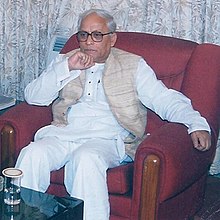Buddhadeb Bhattacharjee
From Wikipedia, the free encyclopedia
(Redirected from Buddhadev Bhattacharya)
| Buddhadeb Bhattacharjee বুদ্ধদেব ভট্টাচার্য | |
|---|---|
 | |
| Buddhadeb Bhattacharjee | |
| 7th Chief Minister of West Bengal | |
| In office 6 November 2000 – 13 May 2011[1] | |
| Preceded by | Jyoti Basu |
| Succeeded by | Mamata Banerjee |
| MLA | |
| In office 1987 – 13 May 2011 | |
| Preceded by | Sankar Gupta[2] |
| Succeeded by | Manish Gupta |
| Constituency | Jadavpur |
| Personal details | |
| Born | 1 March 1944 Calcutta, Bengal, British India |
| Residence | Palm Avenue, Calcutta |
| Alma mater | University of Calcutta |
| Religion | Atheist |
| Signature |  |
| As of January 27, 2007 Source: [CPI(M) official website] | |
Buddhadeb Bhattacharjee (Bengali: বুদ্ধদেব ভট্টাচার্য Buddhodeb Bhôṭṭacharjo; born 1 March 1944) is an Indian politician and a member of thepolitburo of the Communist Party of India (Marxist). He was the Chief Minister of West Bengal from 2000 to 2011. He was the MLA of Jadavpurconstituency for twenty-four years until 13 May 2011, when he was historically defeated by the former Chief Secretary of his own government, Manish Gupta (who previously worked under him)[3] by a landslide 16,684 votes in the 2011 Assembly Election of West Bengal.[3] He is the second West Bengal Chief Minister to lose an election from his own constituency, after Prafulla Chandra Sen in 1967.[4]
Events during his tenure as Chief Minister included attempts to industrialise West Bengal thwarted by the TATA leaving Bengal in the face of relentless opposition by Trinamool congress,[5] the land acquisition dispute in Singur, the Nandigram incident,[6] and the Netai incident.[7]
Early life [edit]
Born in 1944 in north Calcutta, the chief minister belongs to a family which had produced another famous son. Revolutionary poet Sukanta Bhattacharya was his father's cousin. A former student of Sailendra Sirkar Vidyalaya.[8] He studied Bengali literature at the Presidency College, Kolkata, and secured his B.A degree (2nd Class) in Bengali (Honours), later he joined the CPI(M) as a primary member.[9] Besides taking active part in the food movement, he also supported Vietnam's cause in 1968. He was appointed state secretary of the Democratic Youth Federation, the youth wing of the CPI(M) that was later merged into the Democratic Youth Federation of India.
No comments:
Post a Comment